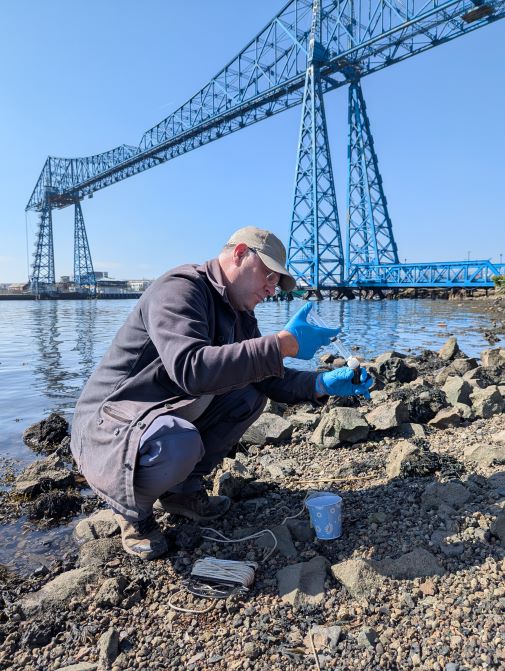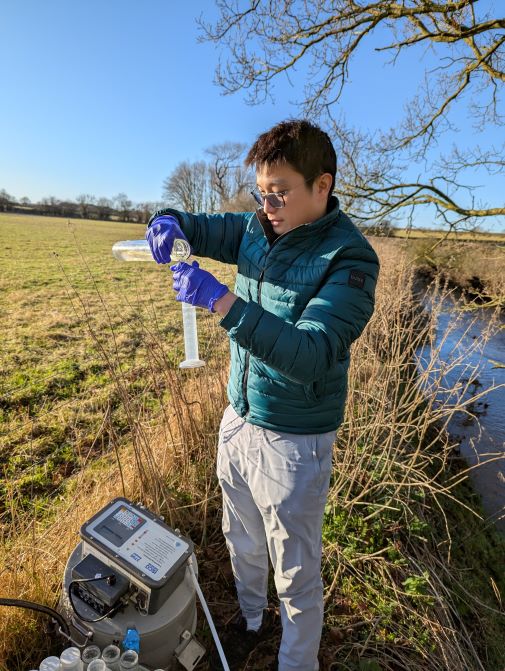A University of York study into the presence of 'forever chemicals' in UK rivers has found some of the highest levels ever recorded.
 Professor Alistair Boxall conducting water sampling in Teesside
Professor Alistair Boxall conducting water sampling in Teesside
The study found Trifluoroacetic acid (TFA), a chemical used in numerous household items, was found in in 98% of 54 sites tested nationwide. The research was conducted collaboratively with the environmental charity Fidra and found some of the concentrations recorded are amongst the highest ever reported globally.
Alarming scientists
Rivers in North Yorkshire are among the worst offenders in the UK, according to the findings.
Sampling was done across 12 locations in North Yorkshire - on the River Foss, River Ouse and River Derwent - with an average of 990 nanograms per litre being found in the region. This made it region with the higher levels of TFA contamination in England. The River Kelvin in Scotland was the most polluted river in the study overall, with TFA mean average concentration levels recorded at 23,968 nanograms per litre.
Health risks
TFA is just one of more than 10,000 PFAS (polyfluoroalkyl substances) now internationally recognised for their adverse health and environmental impacts.
These so-called 'forever chemicals' are highly persistent, mobile and can build up along food chains to potentially harmful concentration levels. Some well studied PFAS have been linked to increased risk of various cancers, liver damage, fertility issues, as well as toxicity amongst wildlife.
Rising concentrations
There is currently no practical or economically viable way to remove TFA from the environment, leading to growing scientific concern over the impact that continually rising concentrations may have on human health and environmental processes.
Alistair Boxall, Professor of Environmental Science in the Department of Environment and Geography, at the University of York said: "Sadly, I am not at all surprised by these results. TFA is a very mobile chemical that doesn't seem to be removed by drinking water treatment systems so it is likely that levels in drinking water will be similar to those we found in some of the rivers.
Stopping at source
"While there are methods to remove TFA from drinking water, these are very expensive and likely impractical. We urgently need to stop chemicals like TFA at source so they don't get into our environment in the first place."
There is an urgent need for policymakers to get on the front foot and make systemic change happen according to Professor Boxall. He added: "As a society, we are constantly playing catch up with the problem of chemical pollution. We urgently need a more effective and proactive approach to the management and monitoring of chemicals in the UK environment so that we protect the health of the ecosystems and humans from the threat of substances like TFA."
Record levels
Of the 54 sites tested in this study, 98% were contaminated with TFA. The mean UK TFA concentration (2211 ng/L) is towards the higher end of the range of average concentrations reported from studies for other countries around the world, greater than levels identified in Germany, Sweden and across the EU. The maximum concentration found in this study (78,464.2 ng/L, Glasgow) is the second highest level of TFA contamination ever recorded in surface water.
The research adds to growing pressure to act on the 'forever chemicals' PFAS, with many scientists and environmental organisations calling for a broad restriction in the UK.
 Dr Jun Li sampling Yorkshire's rivers to monitor levels of chemical pollution
Dr Jun Li sampling Yorkshire's rivers to monitor levels of chemical pollution
Vital insights
Hannah Evans, Project Manager at the environmental charity Fidra said: "This new research is an important first insight into the state of TFA contamination throughout the UK and highlights the wider issue of PFAS pollution across the country. We're now learning more about the risks associated with TFA, but at a stage when it is already widespread in our environment and concentrations are expected to increase. We have seen this before with other PFAS, such as PFOS and PFOA - we urgently need a more proactive approach to addressing harmful chemicals to break this on-going cycle."
There are ways to improve water quality and policymakers in the UK need to learn from successes around the world. Hannah explained: "We know solutions are possible. Countries such as France and Denmark have already made great strides in restricting PFAS use, and the EU is progressing with a proposed ban on all 10,000+ substances. If we are truly to address this issue, we must prioritise source control. We're asking the UK Government to turn off the tap of these persistent 'forever chemicals' and align with the EU's proposed universal PFAS restriction."











